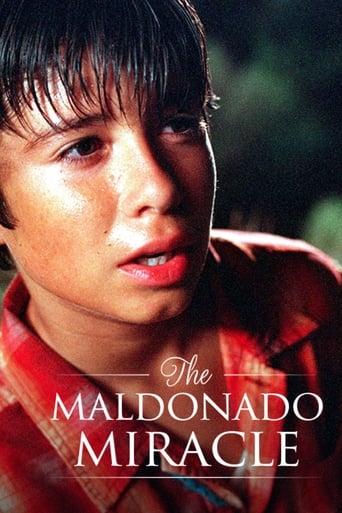gillis-7
I agree with the flaw stated in the above review, however, I liked this film for other reasons. First of all, there is ethnographic value to this film. The religion student may also want to check it out. Peter Fonda is no Captain America here but he shows nice depth in his portrayal of the priest. Brother Amos, portrayed by Scott Michael Campbell, is also top-notch acting. The zealous "miracle-finding" woman drove me more than a bit crazy but I believe that is to Salma's credit for its realism. Check it out, as always, if you don't expect the world to rotate just for your purposes, you will walk away feeling good about the time you just spent.
TexasTruckGal
Salma directs this uplifting movie METICULOUSLY!!! I usually don't boo-hoo at a lot of movies as they are too unrealistic, and more monopolized along the way and geared toward a more favorable "unrealistic" Hollywood ending. Salma, gets down to simple folks with "GENUINE" lives and a very "unique Miracle" that happened to them one day. A town so miniscule, that one would not even consider giving a second thought of finding God there. Salma evidently found this one little town's WORTH was more than gold. Salma incorporates "simple" folks with very real lives, in very REAL situations on a day to day basis. She does not belabor on each of her characters, but allows enough for you to get just a brief glimpse of their ordinary lives. This is by far an extraordinary movie! If she managed this kind of movie with a limited budget, I can only envision what she is capable of if she had MORE to work with. Her creativity, no doubt, would UNDENIABLY SHINE!!! If you ever ponder the thought of wanting to "recover" your faith, this movie will move the very core of your soul!!!! EXCELLENT!!! PAR NONE!!!
aitengri
Like a good piece of music, this film begins and ends with the poignant leitmotif of a whimsical slow waltz (literally, in the film score), a town transformed by the "miracle" in subtle, internal ways, while the flash in the pan economic boom of a tourist influx provides the noisy, festive outer miracle. An "illegal" Mexican boy has arrived in town on foot, looking for his lost father - and he leaves, at the end, with his father, on a bus returning to Mexico. In between, we are privy to a cross section of lives in the town, each life undergoing some sort of miraculous or redemptive change, all of it somehow related to the strange phenomenon of the bleeding Christ statue in the local church.
The external plot framework revolves around the discovery of the "real" cause of the bleeding, while concurrently there is a frantic faith contagion set off by media coverage of the "bleeding Christ".Even as we see individuals pouring into town from everywhere experiencing faith healing a la Lourdes, the film almost loses it with a last minute major thematic flaw. Whether from the book author's choice, or from a modification by the movie adaptation, a last minute switch concerning the identification of the blood sample is thrust upon us, with the implication that the "bleeding Christ" indeed may be an authentic miracle. Unnecessary, and perhaps a bone thrown to those in the reading/viewing audience who would need such a literal validation. Otherwise, maybe they might not "get" the story about the real miracles? In any event, this reviewer feels that the plot twist, coming almost like an afterthought, weakens the genuine effect of the "miracle worker" being the young Mexican boy or that the ways of "God" may be unfathomable, and not dependent upon literal things. To hammer the "miracle" message, there is one gratuitous "drive the point home" line spoken by Peter Fonda (the priest) BEFORE the last minute switch, when he says of the boy, "There's the real miracle"... only to contradict his own insight, and all the development of the movie, when the second blood test comes back, causing the priest to run out of the room shouting "It really IS a miracle". Which is it, or maybe it's both? Confusions abound at this point, along with a passing sense of anticlimax. But fortunately, the film is near its beautiful and poetic end with the sequenced scenes of changes wrought in individual lives. We can decide for ourselves about the real miracles of this miraculous little movie.
George Parker
"The Maldonado Miracle" tells of a SoCal town ala Mayberry RFD with a handful of stereotypical townsfolk type characters who get caught up in a frenzy of activity when a statue of Christ appears to be crying tears of blood. A potpourri of oh so perfectly imperfect people from the parish priest (Fonda) to the cute little poor Mexican boy with a dog who wants to find his papá to the pot bellied Sheriff with a sickly old mother, etc., this flick is a contrived and obvious button-pusher which Hayek is trying turn into a fountain of warm and fuzzies. As one might expect, the film bears the fingerprints of a novice auteur and plays out as little more than a no brainer cable watch for sentimentalists who ascribe to the principle: It is, therefor it's good. Mediocre stuff now on Showtime. (C+)


